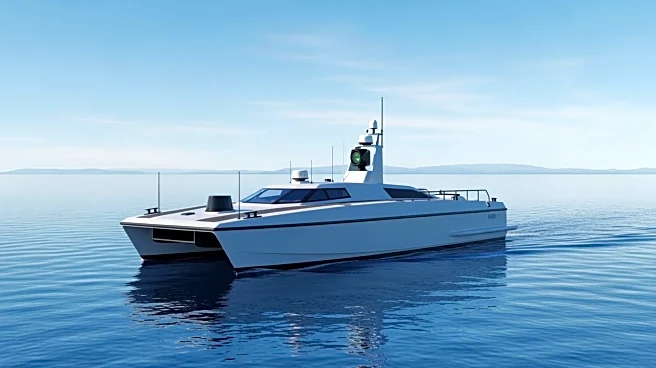What's Happening?
Sweden's Defence Materiel Administration (FMV) has unveiled details of an unmanned surface vehicle (USV) concept demonstrator program aimed at understanding the potential contributions of small to medium-sized USVs in future maritime operations. The program features
the Ran USV, named after the Norse goddess of the sea, which is entering the final year of a three-year test phase. The Ran USV, built by Maritime Robotics, is a 6-meter long, 2,000 kg craft capable of speeds up to 24 knots and carrying payloads up to 400 kg. It is equipped with situational awareness tools such as cameras, AIS class B receivers, radar, and 4G LTE broadband wireless communications. The USV is remotely controlled and monitored by a pilot on a support boat, with capabilities for pre-programmed routes and collision avoidance.
Why It's Important?
The development of the Ran USV concept demonstrator is significant as it represents a strategic move by Sweden to enhance its maritime operational capabilities. By exploring the use of USVs, Sweden aims to improve mission efficiency, particularly in areas such as inter-island resupply, force protection, and seabed surveys. The flexibility and advanced technology of the Ran USV could lead to more effective maritime security measures and operational strategies. This initiative may also influence other nations to adopt similar technologies, potentially reshaping maritime defense strategies globally.
What's Next?
As the Ran USV enters its final year of testing, the FMV will likely focus on refining its operational capabilities and exploring additional use cases. The outcomes of these tests could lead to broader adoption of USVs in Sweden's maritime operations. Stakeholders, including defense agencies and maritime security experts, will be closely monitoring the results to assess the viability of integrating USVs into regular operations. Future developments may include collaborations with other countries or advancements in USV technology to further enhance maritime security.
Beyond the Headlines
The introduction of USVs like Ran could have broader implications for maritime operations, including ethical considerations regarding autonomous systems in defense. The use of USVs raises questions about the balance between human oversight and machine autonomy, particularly in sensitive operations. Additionally, the environmental impact of deploying USVs, which may offer more sustainable options compared to traditional vessels, could be a factor in future maritime strategy discussions.















